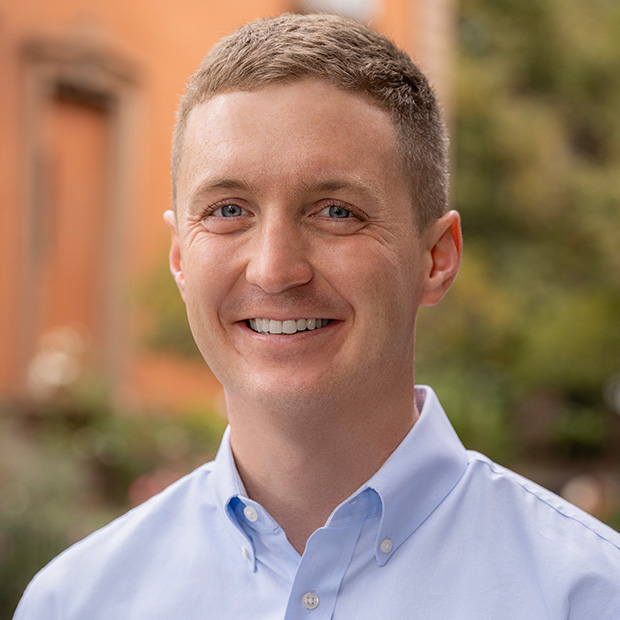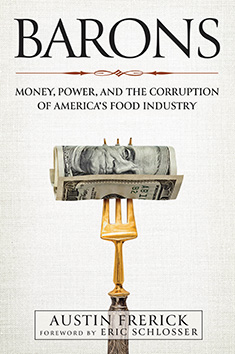MAPs at Grinnell shaped new book by Austin Frerick ’12
March 22, 2024 — Austin Frerick ’12 will come full circle in a multitude of ways when he returns to campus in early April to discuss his new book, Barons: Money, Power, and the Corruption of America’s Food Industry.
The nonfiction book looks at the recent consolidation of power in the U.S. food system through the stories of seven families and describes in vivid and horrifying detail how this entrenched power is leading to worse outcomes for workers, communities, and the environment.
 Austin Frerick ’12
Austin Frerick ’12
Co-sponsored by the Rosenfield Program and the Center for Prairie Studies, Frerick will give a book talk at 7 p.m. CDT April 4 in Joe Rosenfield ’25 Center (JRC) 101. The book will be released on March 26.
As Frerick is quick to point out, the U.S. has been in this same place before around the turn of the 20th century. Back then, “trustbusters,” a movement associated with figures like President Theodore Roosevelt and future Supreme Court Justice Louis Brandeis, helped to liberate people from the tyranny of robber barons and monopolies. Frerick is part of a new generation of academics, attorneys, and policymakers pushing back against monopolies (one owner) and monopsonies (one buyer) that have been allowed to run wild since the 1980s.
An expert on agricultural and antitrust policy, Frerick has worked at the Open Markets Institute, the U.S. Department of Treasury, and the Congressional Research Service before becoming a Fellow at Yale University.
If there’s an origin story for Frerick as a big agriculture trustbuster, it came during his semester at the College spent in the Grinnell-in-Washington program. Frerick interned at a think tank and was tasked with compiling data on U.S. counties with high rates of students receiving free and reduced lunch.
“I plugged in Iowa,” Frerick says, and he found that the counties with the highest number of free and reduced lunch students happened to be both the most ethnically diverse counties in the state and home to major meatpacking centers. He spent the spring semester abroad in Botswana, but contacted Jean Ketter, former associate professor of education, to set up working on a Mentored Advanced Project (MAP) that summer that looked at school districts in Iowa towns where slaughterhouses are located and what could be done policy-wise to help these low-income, majority-minority schools.
Frerick deployed “mixed methods,” taking both a quantitative and qualitative approach. He realized that enrollment and achievement data alone weren’t telling the full story, so he interviewed principals, teachers, mayors, and religious leaders. He and Ketter spent the summer listening to his interviews and conversations, and he credits Ketter with helping him develop a much better understanding of how power manifests itself and operates.
 Book cover for Barons
Book cover for Barons
A “more theoretical” follow-up MAP with Tim Werner, an assistant professor of political science and policy studies at the time, explored the power dynamics in these slaughterhouse communities. Frerick’s interviews and conversations with community leaders were reminiscent of Gilded Era “company towns” and the project began to explore what happens when a community becomes a monopsony. Slaughterhouse towns tend to be monopsonies because the slaughterhouses are the only place buying labor, he says.
It's evident how much these MAPs shaped Frerick’s approach in Barons. Each chapter explores a different contemporary robber baron and their role in the food industry.
“My MAPs were the best and most formative academic experiences of my life,” Frerick says. “It’s so clear how much my MAPs are all over this book. That experience shapes how I think about and look at things to this day.”
Frerick is operating in the tradition of Eric Schlosser (Fast Food Nation) and Michael Pollan (The Omnivore’s Dilemma), combining deep knowledge and research with an accessible, experiential component. In one chapter, he travels to the literal dairy Disneyland built by the dairy barons who developed Fairlife. In another, he treks to Bentonville, Arkansas, to try and understand how Walmart came to become the largest grocer in the U.S., its massive distribution network, and how the company has become a vacuum for federal funding like food stamps.
While Schlosser and Pollan’s work have both triggered reform conversations like calories on menus and organic growing, Frerick hopes that any conversations that Barons triggers could result in a structural shift. The biggest frustration that Frerick faces with this work is “how simple solutions are, and our inability to implement them.”
What he wants fellow Grinnellians and readers to know is that our current food system is an aberration.
“A lot of the reforms I’m talking about and want to see are, honestly, traditional – it’s things like putting animals back on the land. It’s radical that we stuffed millions of animals in these metal sheds, and they’ve never seen the light of day or a blade of grass,” he says. That the traditional seems radical, Frerick argues, is a result of our collective inability to grapple with power. Coupled with that frustration is a sense of how much the language of this new Gilded Age we live in obscures how unnatural many of these systems are.
“It’s really underappreciated how much technocratic language is used to turn people off,” Frerick says. “As a first-generation student, I realized that my superpower is explaining complex things very simply.” Thanks to all those weeks he spent in the Writing Lab with Director Janet Carl, Frerick may be perfectly positioned to break through it.
Frerick admits that the responses he’s received when talking about his work are what keep him going. Last fall, Policy Studies Assistant Professor Andreas Jozwiak asked if Frerick would present a few chapters of Barons to his policy class.
“I have been working on this book for five years, and Professor Jozwiak’s students were the first people to read the book besides my husband and my editor,” Frerick recalls. “To be honest with you, I was giddy with their responses. At this point, I read agriculture news every day, and I’m just numb to this stuff. I forget that if you’re 19 years old and coming into this new, you might have a big reaction to learning that Krispy Kreme is owned by a German family with a dark, Nazi past.”
Frerick’s visit to Jozwiak’s class coincided with Family Weekend last fall, and it triggered memories of his entire family (parents, grandparents, aunts, uncles) all descending on Grinnell to hear those MAP presentations a decade ago. Brother Andrew Frerick ’14 didn’t have to travel far. Their sister Abby Frerick ’21 also eventually became a Grinnellian.
In some sense, Frerick thinks that students in Grinnell are well positioned to make an impact in the fight for a fairer food system and antitrust work. He notes that many of the people doing this work now, like Federal Trade Commissioner Lina Khan, are liberal arts graduates. He wouldn’t be surprised if a new iteration of Grinnell’s New Deal legacy with alumni like Harry Hopkins 1912, Hallie Ferguson Flanagan 1911, and Florence Stewart Ker 1912 could happen again.
Geography plays an important role as well. “Grinnell and Iowa are at the heart of the most industrialized food system in the world,” Frerick says. “There are so many examples of how it works going on all around you, and you can have honest conversations about it in ways that you can’t get at any other school in Iowa or the Midwest.”
— by Joe Engleman ’14